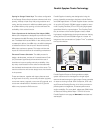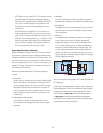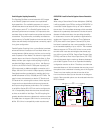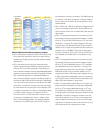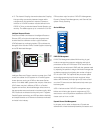42
Although there is a signifi cant value in a single footprint
and multi-footprint environment with resource sharing,
those customers looking for high availability must move
on to a database data sharing confi guration. With the
Parallel Sysplex environment, combined with the Workload
Manager and CICS TS or IMS TM, incoming work can
be dynamically routed to the z/OS image most capable
of handling the work. This dynamic workload balancing,
along with the capability to have read/write access data
from anywhere in the Parallel Sysplex cluster, provides the
scalability and availability that businesses demand today.
When confi gured properly, a Parallel Sysplex cluster has
no single point of failure and can provide customers with
near continuous application availability over planned and
unplanned outages. For detailed information on IBM’s
Parallel Sysplex technology, visit our Parallel Sysplex home
page at ibm.com/servers/eserver/zseries/pso.
Coupling Facility Confi guration Alternatives
IBM offers different options for confi guring a functioning
Coupling Facility:
• Standalone Coupling Facility: z900 Model 100 and z800
Model 0CF servers provide a physically isolated, totally
independent CF environment. Like the z990, there is no
unique standalone coupling facility model offered with
the z890. Customers can achieve the same physically
isolated environment as on prior mainframe families by
ordering a z890 or z990 with PUs characterized as ICFs
and general purpose PUs. There are no software charges
associated with such confi guration. An ICF or CF partition
sharing a server with any operating system images not in
the sysplex acts like a logical standalone CF.
• Internal Coupling Facility (ICF): Customers consider-
ing clustering technology can get started with Parallel
Sysplex technology at a lower cost by using an ICF
instead of purchasing a standalone Coupling Facility.
An ICF feature is a processor that can only run Coupling
Facility Control Code (CFCC) in a partition. Since CF
LPARs on ICFs are restricted to running only CFCC,
there are no IBM software charges associated with
ICFs. ICFs are ideal for Intelligent Resource Director and
resource sharing environments as well as for data shar-
ing environments where System-Managed CF Structure
Duplexing is exploited.
• Coupling Facility partition on a zSeries server using
standard LPAR: A CF can be confi gured to run in
either a dedicated or shared CP partition. IBM software
charges apply. This may be a good alternative for test
confi gurations that require very little CF processing
resource or for providing hot-standby CF backup using
the Dynamic Coupling Facility Dispatching function.
A Coupling Facility can be confi gured to take advantage of
a combination of different Parallel Sysplex capabilities:
• Dynamic CF Dispatch: Prior to the availability of the
Dynamic CF Dispatch algorithm, shared CF partitions
could only use the “active wait” algorithm. With active
wait, a CF partition uses all of its allotted time-slice,
whether it has any requests to service or not. The
optional Dynamic CF Dispatch algorithm puts a CF parti-
tion to “sleep” when there are no requests to service and
the longer there are no requests, the longer the partition
sleeps. Although less responsive than the active wait
algorithm, Dynamic CF Dispatch will conserve CP or ICF
resources when a CF partition has no work to process
and will make the resources available to other partitions
sharing the resource. Dynamic CF Dispatch can be
used for test CFs and also for creating a hot-standby
partition to back up an active CF.
• Dynamic ICF Expansion: Dynamic ICF expansion pro-
vides value by providing extra CF capacity when there
are unexpected peaks in the workload or in case of loss
of CF capacity in the cluster.










